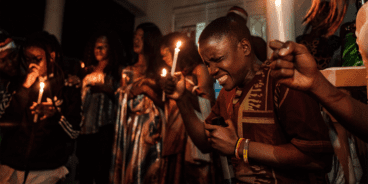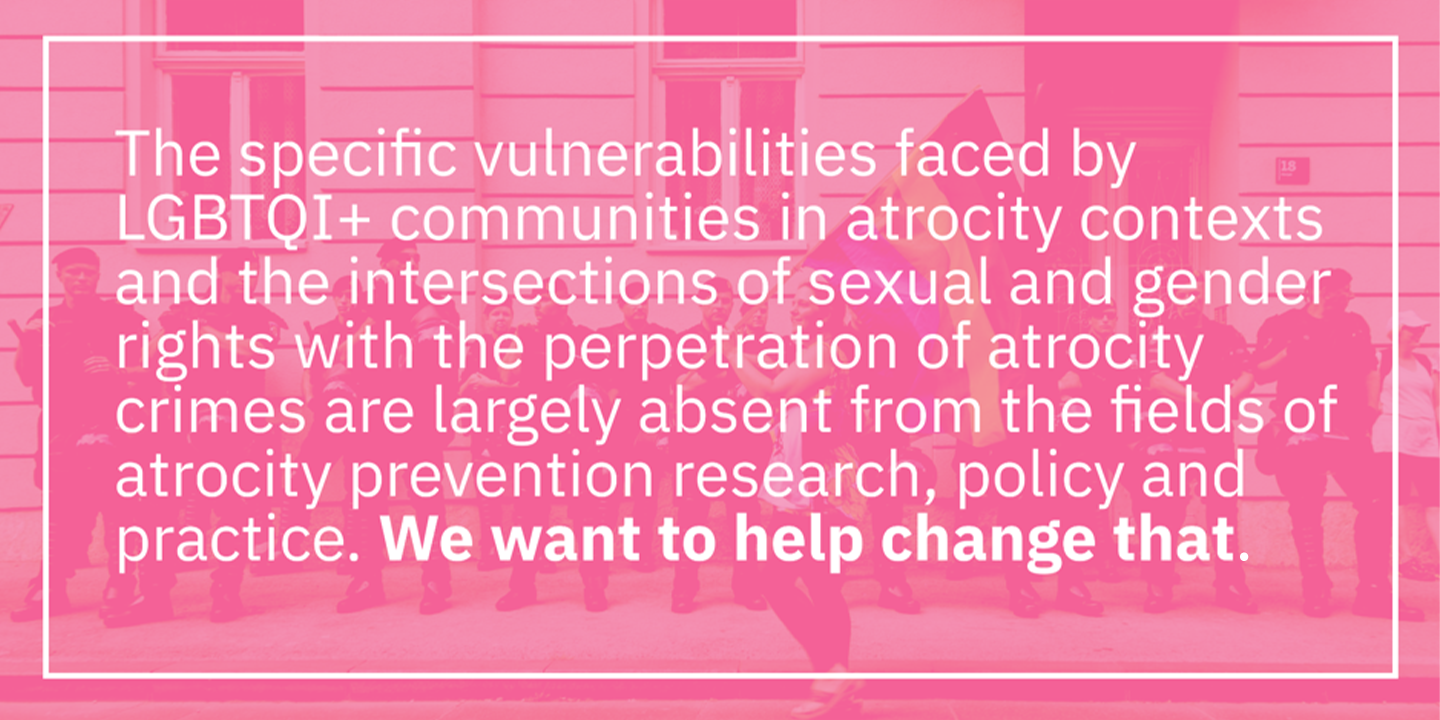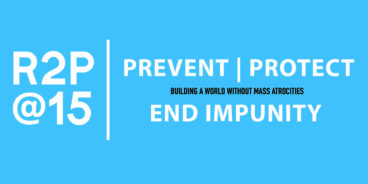

Sector Statement on Queering Atrocity Prevention
Queer people’s experience of genocide, crimes against humanity and war crimes is not new. From the British Indian Penal Code of 1860, the Holocaust, the ongoing anti-gay purges in Chechnya, and legal shifts which persecute members of the LGBTQI+ community and allies, LGBTQI+ communities have been, and still are, deliberately targeted by systematic violence and discrimination. Some of these campaigns can be described as mass atrocity crimes, while others sound the alarm and significantly increase risk for the incidence of mass atrocity crimes against LGBTQI+ communities across the world. And yet understanding of this experience is not well-developed nor widely-discussed. In fact, queer people’s experiences can often be deliberately silenced in policy and research on identity-based violence and mass atrocities – a problem which is further compounded by threats to safety faced by queer populations that can make it dangerous for them to make their experiences and expertise heard and accounted for.
As members of the atrocity prevention field, we know that widespread or systematic violent targeting of LGBTQI+ people can often look different from the widespread or systematic violent targeting of ethnic, indigenous, national, religious and racial groups that traditionally dominate the atrocity prevention and response agenda. However, crimes against LGBTQI+ individuals and communities may still meet the conceptual and legal thresholds of mass atrocity crimes, including genocide, war crimes and crimes against humanity.
We know, too, that the absence of LGBTQI+ professionals and queer analysis from atrocity prevention work normalises and institutionalises pre-existing heteronormative and patriarchal structures. This perpetuates the exclusion of LGBTQI+ communities in – and from – atrocity prevention work.
Taking a look through the history of atrocity crimes, we know that the imposition or intensification of heteronormative, patriarchal power structures through legislation and the weaponization of culture nearly always come ahead of widespread or systematic targeting of LGBTQI+ people and other groups. Despite this, the specific vulnerabilities faced by LGBTQI+ communities in atrocity contexts and the intersections of sexual and gender rights with the perpetration of atrocity crimes are largely absent from the fields of atrocity prevention research, policy and practice. We want to help change that.
Recognising these common gaps in the atrocity prevention and response field, we call on our sector to ‘queer atrocity prevention.’ We argue that queering atrocity prevention must go beyond identifying and accounting for the risks and vulnerabilities that queer communities face. It must challenge the very structures and processes – cis-heteronormativity, authoritarianism, democratic backsliding and the internationalisation of malign networks to name a few – that perpetuate identity-based violence against LGBTQI+ persons. It also requires atrocity prevention work to go beyond cosmetic commitments or performative rhetoric that only seeks to include or mainstream LGBTQI+ communities, and into a more fundamental questioning and reworking of the systems and dynamics that have historically enabled the exclusion of LGBTQI+ experiences and expertise.
We believe that those of us who seek a world free from mass atrocity crimes must also learn from contributions of resistance made by queer communities. Policymakers, practitioners, scholars and activists alike should support, collaborate and partner with LGBTQI+ communities in pursuit of effective, future-proofed and linked-up horizontal atrocity prevention. This should include partnerships to understand, monitor, analyse and communicate risks, in addition to centring LGBTQI+ communities as key actors in early warning, designing, planning, implementing and in leading prevention and response efforts.
The principles of atrocity prevention teach us that the antecedents of mass atrocity crimes exist to greater or lesser extents in all states and societies. So too do heteronormative and patriarchal power structures. Our commitment to address these gaps and to queer our work begins in the societies and states from which we work and extends globally.
As individuals, organisations and a community of practice, we are always learning how to better live, uphold and further the pursuit of equality and justice. In our efforts to do so, we present these working commitments and call on our peers in the atrocity prevention sector to join us in our ongoing efforts to confront the heteronormative patriarchal power structures that perpetuate atrocity crimes against LGBTQI+ individuals, and to centre LGBTQI+ communities’ unique risks, vulnerabilities and expertise in our work.
We, the undersigned, commit to:
-
-
- Examine our blindspots and encourage a sector-wide conversation about how we can ensure our tools and practices are fit for the purpose of contributing to the protection of LGBTQI+ people from atrocity crimes;
- Be proactive and build more inclusive internal policies to protect the rights and recognise the needs of our LGBTQI+ staff;
- Include LGBTQI+ people in early warning research, both as researchers and as subjects that face additional risks;
- Recognise the social constructs of gender, reject binary assumptions about sex/gender, and move beyond the implicit assumption that the communities we are researching and advocating for are cisgender or heterosexual;
- Commit time to examine relationships between colonialism, heteronormativity and racism that have historically driven, and continue to drive, the prevalence of mass atrocity violence globally;
- Engage with the writing, thought, activism and endeavours of currently and formerly colonised populations around the world
- Collaborate with and center the experiences of local populations (or their accounts of their experiences of domestic sexual politics);
- Think more expansively about the intersections of gender and sexuality, queer politics and feminist politics, rather than restricting the conversation only to ‘gender or ‘women’; and
- Advocate for atrocity prevention funding becoming far more LGBTQI+ inclusive in ways that reflect localised contexts and political circumstances, as well as the needs of organisations and their staff;
- Acknowledge, resist and challenge pinkwashing and attempts at concealing, legitimising, or distracting from violence against different minoritized communities, by promoting LGBTQI+ rights gains.
-
The responsibility to protect all populations from atrocity crimes is a shared one. We therefore ask our colleagues and partners to join us in these commitments.
Organisational signatures:
- ALTSEAN-Burma
- Asia-Pacific Centre for the Responsibility to Protect
- European Centre for the Responsibility to Protect
- Global Centre for the Responsibility to Protect
- Global Justice Center
- Institute for Genocide and Mass Atrocity Prevention, Binghamton University
- International Alert
- International Rescue Committee
- Jiyan Foundation for Human Rights
- Korea Future
- Nonviolent Peaceforce
- Peace Direct
- Protection Approaches
- Remembering Srebrenica
- Rights for Peace
- Sri Lanka Campaign for Peace and Justice
- Stonewall
- The Lemkin Institute for Genocide Prevention
- The Stanley Center for Peace and Security
- United Nations Association – UK
- Waging Peace
Individual signatures:
- Aydan Greatrick, PhD Candidate, University College London
- Charles J. Brown, Partner, Strategy for Humanity
- David Eichert, PhD Candidate, London School of Economics
- Dr Adrian Gallagher, Professor in Global Security and Mass Atrocity Prevention, University of Leeds.
- Dr Andrew Delatolla, Lecturer in Middle Eastern Studies, University of Leeds
- Dr Cristina G. Stefan, Associate Professor of International Relations, University of Leeds
- Dr Dean Cooper-Cunningham, Lecturer, Sheffield University
- Dr Elisa von Joeden-Forgey, PhD, Endowed Chair in Holocaust & Genocide Studies, Keene State College (USA), Co-President, Lemkin Institute for Genocide Prevention
- Dr Glenn Timmermans, Department of English, University of Macau
- Dr Jess Gifkins, Lecturer, University of Manchester
- Dr Karen Smith, Lecturer, University of Leiden; former Special Adviser to the UN Secretary-General on the Responsibility to Protect
- Dr Sarah Teitt, Deputy Director, Asia Pacific Centre for the Responsibility to Protect, The University of Queensland
- Dr Shanon Shah, Visiting Research Fellow, King’s College London
- Dr Simon Adams, President and CEO of the Center for the Victims of Torture.
- Dr Stephen McLoughlin, Assistant Professor, Centre for Trust, Peace and Social Relations, Coventry University
- D. Wes Rist, Deputy Executive Director, American Society of International Law
- Fred Carver, Director, Strategy for Humanity
- Irene Victoria Massimino, Co-President, Lemkin Institute for Genocide Prevention
- Jack Mayerhofer, Deputy Executive Director, Auschwitz Institute for the Prevention of Genocide
- Jens Stappenbeck, board member, Genocide Alert e.V.
- Jocelyn Getgen Kestenbaum, Associate Professor of Clinical Law, Cardozo Law
- Lily Nellans, Doctoral Researcher, Department of Political Science, University of Toronto
- Marie Lamensch, Project Coordinator, Montreal Institute for Genocide and Human Rights Studies
- Matthew Waites, Reader in Sociology, University of Glasgow
- Patrick Vernon, Doctoral Researcher, POLSIS, University of Birmingham
- Professor A. Dirk Moses, Senior Editor, Journal of Genocide Research
- Prof. Elena Fiddian-Qasmiyeh, Professor of Migration and Refugee Studies, University College London
- Rachel Locke, Director, Violence, Inequality and Power Lab, University of San Diego
- Tali Nates, Director, Johannesburg Holocaust & Genocide Centre
- Tanya L. Domi, Assistant Professor of International and Public Affairs, Columbia University Harriman Institute
- Tibi Galis, Executive Director, Auschwitz Institute for the Prevention of Genocide
We acknowledge, and are grateful for, organisations and individuals in our sector who expressed support and solidarity with the statement, but were not able to sign on publicly for their own safety and/or the safety of their staff
The statement is still open for signatures. If you would like to sign on in your individual or organisational capacity, please email our Queering Atrocity Prevention Coordinator at farida.mostafa@protectionapproaches.org
Related Content

